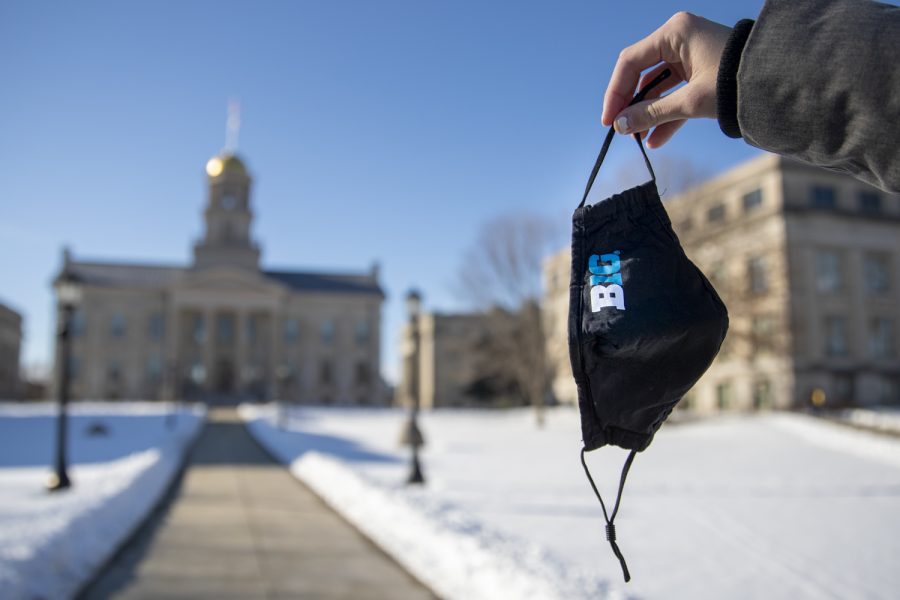Some Big Ten universities move online, UI remains in person
As the new semester starts, colleges and institutions have had to make a choice on whether or not to move online or start the semester in person. Under guidance from the state Board of Regents, the University of Iowa will start classes as scheduled in person.
Photo illustration by Jerod Ringwald.
January 17, 2022
A rise in COVID-19 cases has left Big Ten institutions to choose how to mitigate the virus as students return to class.
At the University of Iowa, classes will take place in person as scheduled. The UI currently does not have a mask or vaccine mandate and does not require students to be tested for the virus before moving back into residence halls.
Masks are required at all other Big Ten universities, and five of those universities require COVID-19 vaccinations.
Seven of the 14 Big Ten universities require a negative COVID-19 test before students can return to campus.
At the Iowa state Board of Regents meeting on Wednesday, Regents President Mike Richards said the regent institutions will continue to meet in person. He encouraged members of the students, faculty, and staff to get vaccinated.
“We are all tired of COVID, but the single most important thing that anyone can do is get vaccinated,” he said. “We all need to use our common sense and take individual responsibility for managing our own health care.”
— COGS/UE Local 896 (@cogsunion) January 14, 2022
The Campaign to Organize Graduate Students, the union representing graduate students at the UI, has called for instructors to voluntarily move their classes online for the first two weeks of class. Instructors who do so without permission would be violating university policy.
“To be clear, the e-pivot is an act of civil disobedience,” COGS wrote in a slideshow explaining the request, which they call an e-pivot. “Moving online on our own technically violates University policy that requires in-person teaching.”
Riley Hemmie, a UI first-year student, said he wouldn’t mind having to take a COVID-19 test before coming back to campus and returning to the residence halls.
“I had to go to a concert and they had me [test]. I would think they might at least do that for my university where there’s a lot of people,” he said. “I know some people aren’t going to be very responsible about it.”
On Monday, the UI reported 75 new COVID-19 cases among students and 57 among employees since Friday.
Related: UI to stock health stations with KN95 masks
One Big Ten school requiring students to test before returning is Northwestern University, whose classes start in person on Jan. 18.
Northwestern opted to create a two-week Wildcat Wellness period that started Jan. 1 and lasted until Jan. 17, where all classes and activities moved online. Students had to report two negative COVID-19 tests while on campus for the two weeks.
“This wellness period will enable students to settle back into our highly vaccinated community and allow the University to identify and address positive cases to minimize spread,” Northwestern Vice President for Operations Luke Figora wrote in an announcement to students. “We encourage students to avoid large indoor social gatherings.”
Northwestern, along with Rutgers University, the University of Illinois, and Michigan State University, all started the semester online as opposed to in-person.
At the University of Michigan, classes began in-person as planned on Jan. 5. However, students had to test negative before moving back into residence halls. Michigan also requires students and faculty to be fully vaccinated and boosted by Feb. 4.
Students at Rutgers will be attending classes remotely through Jan. 30, the school announced on Jan. 4. Rutgers also requires all students and faculty be fully vaccinated and boosted, and also has re-entry testing and regular testing.
Angie Reams, UI associate vice president and dean of students, wrote in an email to all students on Jan. 7 that classes would start in-person as scheduled on Jan. 18.
The email encouraged students to get COVID-19 vaccinations and booster shots, avoid large gatherings, get tested, and wear a mask.
“Johnson County and the university campus are experiencing a surge in positive COVID-19 cases. So, as you prepare to return, please consider taking additional measures to protect your health and the health of our community,” Reams wrote. “We can get through this together with everyone’s continued vigilance.”
For Hemmie, remaining in-person and starting classes on time did not concern him as long as he took safety measures, he said.
“I personally wouldn’t like the first two weeks being online,” he said. “If I’m here, I might as well be there, and then have precautions while in-person.”
The UI has added additional safety measures to start the new semester, including testing kits at every residence hall and Student Health location and providing KN95 respirators at health stations in campus buildings.
UI first-year student Isabella Kees said she feels wary about returning to in-person lectures because of the large number of people.
However, she said she feels more comfortable in smaller classes and discussions.
“Lectures, you’re just being talked to, so I don’t think it’s necessary for us to cram 250 kids in a room with a COVID spike going on,” Kees said.
As for testing policies, Kees said she thinks it would be smart for the university to require testing because she thinks that students won’t self-report their results.
“I think it’s a pretty easy thing to be done,” Kees said. “I don’t think that you can trust that kids are going to go and get tested because that means you’re going to be in quarantine for a certain amount of time.”



